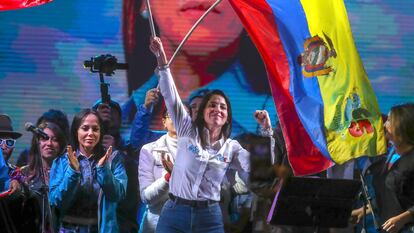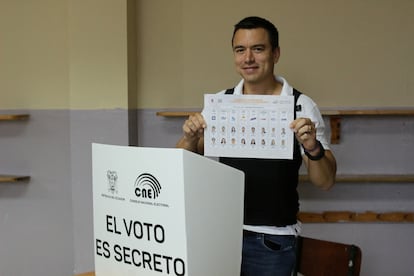Election results in Ecuador: Correa ally Luisa González and business tycoon Daniel Noboa to face off in presidential runoff
The candidate for the Citizen Revolution Movement won 33% of the vote in the first round, while the businessman came in second place with 24%


The first round of the Ecuador’s presidential election was won Sunday by Luisa González, the candidate of Citizen Revolution Movement, the party founded by former president Rafael Correa. With 85% of ballots counted, González won 33% of the vote, while the businessman Daniel Noboa came in second place with 24%. To win outright, a candidate needed 50% of the vote, or to have at least 40% with a 10-point lead over the closest opponent. As no candidate reached this threshold, a runoff between the González and Noboa will be held on October 15.
The race is shaping up to be a similar dynamic to the 2021 election, when the Correa-backed candidate Andrés Arauz faced off against banker Guillermo Lasso, who had the support of the economic and business elite. That battle was won by Lasso, but back then, Ecuador and the Citizen Revolution Movement were in a very different situation to the one they are in today. After years of decline, the Citizen Revolution Movement is making a comeback — as seen in the party’s wins in the regional and municipal elections in February. Meanwhile, the country is facing its biggest security crisis in its history.
The first surprise of Sunday’s election night was the success of Noboa. Polls did not foresee that he would make it to the runoff, but he gained ground after his performance in last weekend’s presidential debate, which took place just days after the assassination of presidential candidate Fernando Villavicencio. The 35-year-old businessman is the son of multimillionaire Alvaro Noboa, who made five unsuccessful bids for the presidency. Daniel Noboa will now try to achieve what his father failed to do.
Villavicencio was listed on the ballots despite being assassinated two weeks ago while leaving a campaign rally. His murder — which shocked the campaign and highlighted the sweeping violence in Ecuador — happened so close to the first round of the election that there was not enough time to reprint the ballots. Correa’s name, on the other hand, was not on the ballot, but he loomed large over the elections. Many voters said they were voting for Correa by casting their ballot for González, who was unknown to many until a few months ago. The fact that she was backed by Correa — who is living in exile in Belgium — was enough to convince many supporters.

Christian Zurita (who replaced Villavicencio after his assassination) and Jan Topic, the so-called Nayib Bukele of Ecuador, came in third and fourth place, respectively. Both were almost 10 points below Noboa. The first to concede defeat in the first round was former vice president Otto Sonnenholzner, who was in office under Lenin Moreno. He conceded defeat when just 10% of the votes had been counted. Topic and Zurita followed suit soon after. All three had been polling ahead of Noboa, who said he had no intention of creating an anti-Correa coalition with the two. “I am in favor of creating a new project,” he said after the vote. Topic, however, has already called on his voters to back Noboa.
The first round took place amid a state of emergency that was called following Villavicencio’s assassination. The day passed without incident, although the candidates had added security measures. Zurita donned a helmet and bulletproof vest, and was surrounded by soldiers.
President Lasso, who did not run for reelection, said that, with these early elections, he was giving back to the people the power they gave him to govern. Lasso decided to shorten his mandate last May when he announced the surprise dissolution of the National Assembly and called for new elections. The president took the decision to avoid an impeachment trial over alleged corruption. The next president will govern only until the end of this term, which will last for another 18 months.
It’s a short amount of time to address all the challenges facing Ecuador, which have come to the fore in this campaign. Citizens list insecurity as their top concern, but stamping it out is not likely to be easy. In the last three years, violence has grown amid the increased presence of drug trafficking groups from Colombia and Mexico, which are fighting for control of areas in Ecuador, especially on the Pacific coast.
Sign up for our weekly newsletter to get more English-language news coverage from EL PAÍS USA Edition
Tu suscripción se está usando en otro dispositivo
¿Quieres añadir otro usuario a tu suscripción?
Si continúas leyendo en este dispositivo, no se podrá leer en el otro.
FlechaTu suscripción se está usando en otro dispositivo y solo puedes acceder a EL PAÍS desde un dispositivo a la vez.
Si quieres compartir tu cuenta, cambia tu suscripción a la modalidad Premium, así podrás añadir otro usuario. Cada uno accederá con su propia cuenta de email, lo que os permitirá personalizar vuestra experiencia en EL PAÍS.
¿Tienes una suscripción de empresa? Accede aquí para contratar más cuentas.
En el caso de no saber quién está usando tu cuenta, te recomendamos cambiar tu contraseña aquí.
Si decides continuar compartiendo tu cuenta, este mensaje se mostrará en tu dispositivo y en el de la otra persona que está usando tu cuenta de forma indefinida, afectando a tu experiencia de lectura. Puedes consultar aquí los términos y condiciones de la suscripción digital.








































